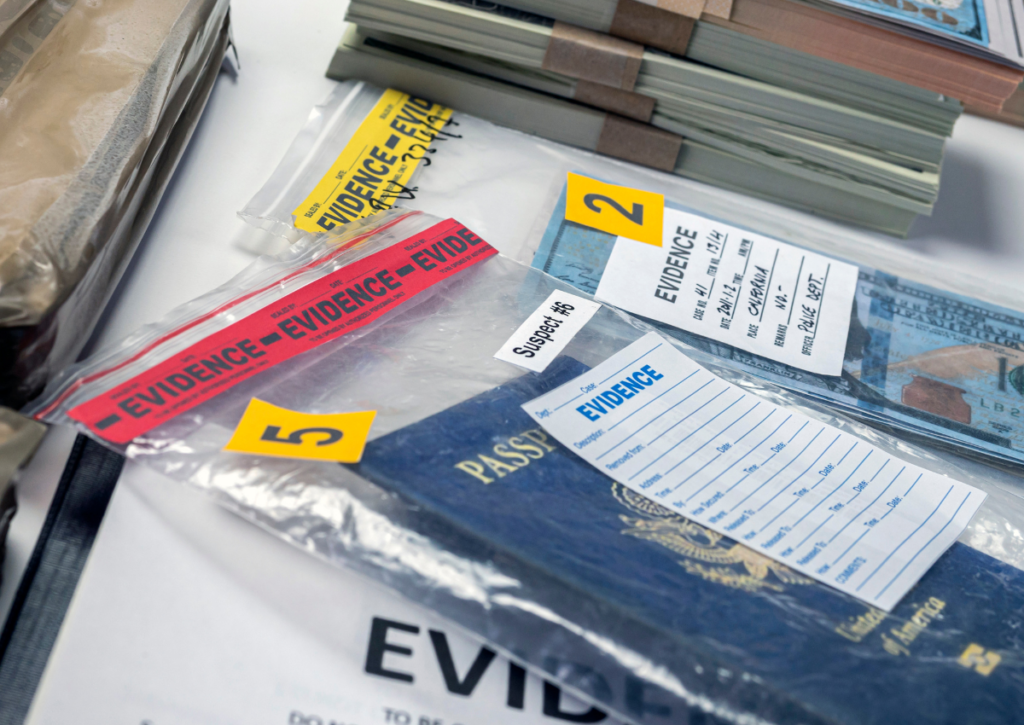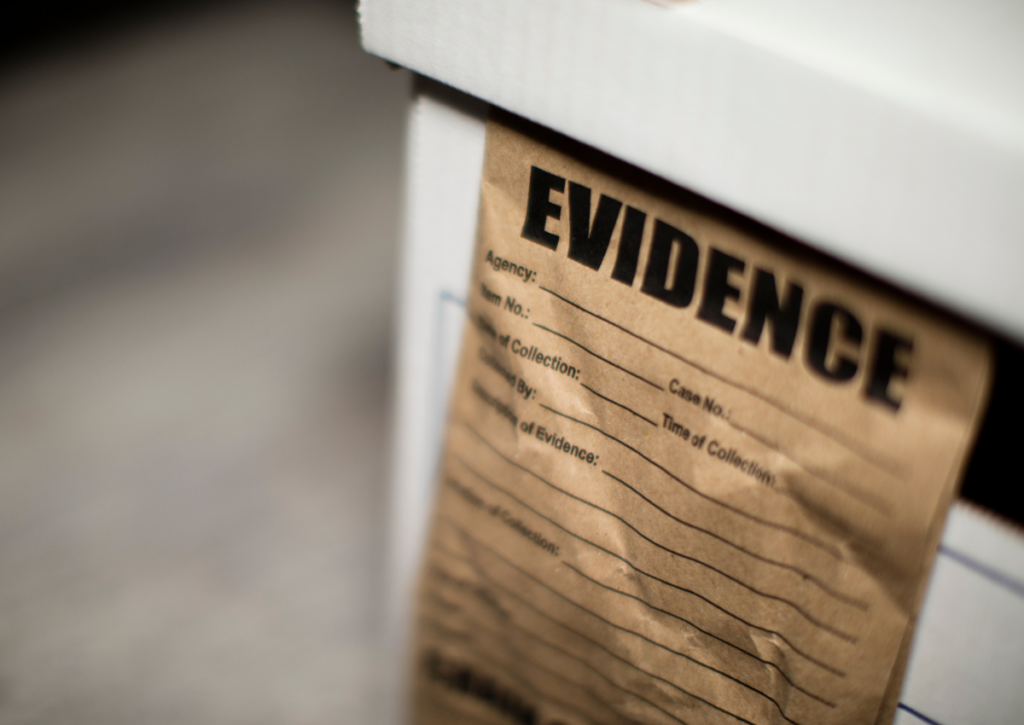The Role of Evidence in Indiana Criminal Trials
In the complex landscape of criminal law, the role of evidence is pivotal in shaping the outcomes of criminal trials in Indiana. Evidence encompasses all crucial facts and data that can be used against the accused in criminal proceedings within Indiana courts. Whether it's physical evidence, such as DNA or fingerprints, or documentary evidence including emails or written correspondence, every piece of evidence plays a significant role in determining the course and outcome of a criminal trial.
The Indiana rules governing evidence have been established to ensure fairness and justice in criminal trials. These rules dictate what evidence can be admitted in court, how it must be presented, and the procedure for challenging its admissibility. The Indiana courts have a stringent system where both the prosecution and defense present their evidence under the oversight of a judge, ensuring that only relevant and permissible evidence is considered during the trial.
In Indiana criminal trials, the burden of proof lies with the prosecution, which must prove the defendant's guilt beyond a reasonable doubt. This is where evidence assumes a critical role. The prosecution will present a compelling narrative supported by tangible evidence to substantiate claims made against the accused. Conversely, the defense counsel's strategy revolves around questioning the credibility, reliability, and truthfulness of the evidence presented. They might attempt to demonstrate that the evidence is insufficient, improperly obtained, or otherwise inadmissible according to Indiana’s rules on evidence in court.
The rules governing evidence have a profound impact on the defense's approach in criminal cases. For instance, evidence such as witness testimony can be crucial but is also susceptible to challenges regarding its credibility or potential bias. Knowing what evidence the opposing side holds through a process called discovery is instrumental for defense counsel. This enables them to formulate counterstrategies, often challenging evidence admission or introducing their own evidence to bolster the defense narrative.
In Indiana criminal trials, every stage from initial discovery to the final verdict hinges on the rules of evidence. The discovery process is essential as it requires both sides to share evidence that will be presented in court. This transparency ensures both parties can prepare adequately, reducing the chances of surprise evidence and allowing for a fairer trial process. Understanding the impact of discovery and the type of evidence that can be used in court is crucial for defendants and their legal teams. Failing to anticipate evidence or prepare adequately for its challenge can severely jeopardize the defense’s ability to contest the charges effectively.
Defending against evidence in Indiana requires a detailed understanding of both the legal implications and the practical strategies necessary to navigate the complexities of a criminal trial. Defense strategies may include filing motions to suppress evidence deemed illegally obtained or irrelevant. Ultimately, the rules governing evidence determine what can be presented in court, shaping the defense’s approach to challenge the evidence’s admissibility and relevance. At The Law Office of Jesse Sanchez, our practice is deeply rooted in these procedural intricacies of Indiana courts, ensuring that our clients receive a robust defense against all evidence presented in criminal trials.
In conclusion, evidence is the backbone of any criminal trial process within Indiana. Understanding its role, the procedures for presenting and challenging it, and the strategic considerations for defense are essential for any accused individual facing a court trial. The Law Office of Jesse Sanchez remains committed to providing exceptional legal guidance and representation, ensuring that the rules governing evidence are leveraged effectively to safeguard our clients’ interests.
Understanding Discovery and Its Impact on Criminal Cases
In the realm of criminal prosecution, the discovery process plays a pivotal role in shaping the trajectory of a criminal case. Discovery encompasses the formal exchange of evidence between the defense and the prosecution, a critical phase in preparing for trial. This exchange is vital because it allows both parties to comprehend the full scope of the evidence, be it documents, recordings, or witness statements, that will be presented against the defendant. The Law Office of Jesse Sanchez emphasizes that understanding the nuances of discovery is imperative for anyone facing criminal charges, as it can greatly influence the outcome of criminal cases.
Discovery is the foundation upon which criminal cases are built. In Indiana, as in many jurisdictions, the prosecution must disclose all relevant evidence to the defense. This means that the defense has the right to review the evidence that the prosecution will rely on during the trial. A thorough discovery process can unveil critical information about the crimes involved, whether it’s a simple theft case or a complex murder case. This process ensures that there are no surprises during the trial and that the defense can formulate a robust strategy to challenge the prosecution's claims.
One significant aspect of discovery involves witness testimonies. Both the prosecution and defense must provide lists of witnesses they intend to call on during the trial. Eyewitness accounts can be pivotal in a criminal case, but they can also be scrutinized for reliability and accuracy. Understanding which witnesses will testify and what their testimonies will entail empowers the defense to prepare appropriate cross-examinations, thereby potentially discrediting the eyewitness accounts that might have seemed definitive. The preparation for these testimonies can alter the case's direction dramatically.
The impact of discovery on a criminal case cannot be overstated. With the correct strategic approach, discovery can uncover weaknesses in the prosecution’s case, offering the defense a chance to negotiate a plea deal or even file motions to dismiss certain charges. For instance, if the discovery process reveals that critical evidence was obtained unlawfully, the defense can move to suppress such evidence, rendering it inadmissible in court. This action can significantly weaken the prosecution’s case, as crucial pieces of evidence may no longer be available to support their assertions.
For individuals facing serious charges like murder, understanding the discovery process becomes even more critical. The ability to access and analyze all aspects of the evidence, from forensic reports to witness depositions, equips defendants with the knowledge needed to challenge the prosecution’s narrative. An arrest does not necessarily mean conviction, and with the right legal strategy that leverages the full power of discovery, the outcome of the case can shift favorably for the defendant.
It’s essential to note that not all evidence obtained during discovery will be presented in trial. The prosecution must decide which pieces of evidence will support a compelling case against the defendant. However, discovery ensures that both parties are informed and not caught off guard. As The Law Office of Jesse Sanchez can attest, effective use of discovery strategies is paramount in defending clients against criminal charges, ensuring that no stone is left unturned in pursuit of justice. In conclusion, understanding discovery and its impact on criminal cases is indispensable for defendants and defense counsel, as it can mean the difference between conviction and acquittal in the high-stakes arena of Indiana's criminal courts.
What Evidence Must You Worry About in Court?
In the context of Indiana criminal trials, understanding the evidence that may be used against a defendant is crucial. At The Law Office of Jesse Sanchez, we believe that knowledge of the rules governing evidence is fundamental in protecting a defendant's rights. The Indiana Rules of Evidence play a pivotal role in determining what evidence can be admitted in court. This includes various types of evidence such as testimonial evidence, documentary evidence, and physical evidence. It’s imperative for both the defendant and their attorney to comprehend what evidence must be considered during a trial.
First and foremost, testimonial evidence in the form of witness statements or personal testimony is significant. A witness who observed the alleged crime might be summoned to court to give a statement about what they saw. The credibility of these testimonies can often make or break a case, so understanding their potential impact is essential. Attorneys must rigorously examine the reliability of the testimony offered by witnesses to ensure justice for the defendant.
Furthermore, physical evidence, like fingerprints or DNA samples, is frequently used in court. This kind of evidence provides tangible proof that can be compelling to a judge and jury. Defendants should be aware that such evidence can be technically challenging to dispute, which is why having an attorney who can scrutinize the methods used to collect and analyze physical evidence can be an invaluable asset in court.
Documentary evidence, such as emails, text messages, and official records, can also be wielded against a defendant. The court will evaluate the authenticity and relevance of each document presented. It is crucial to ensure that these documents are not used out of context. Therefore, a defendant’s attorney must diligently review all documentary evidence to refute any misinterpretations that the opposition may attempt to introduce.
One must also consider evidence as it relates to previous statements made by the defendant. Any prior admissions, confessions, or statements may be utilized in court and weighed against the defendant. It is the attorney’s responsibility to challenge how this evidence was obtained to argue its admissibility under the Indiana rules.
Defendants must also be concerned with circumstantial evidence, as this can influence the perspectives of jurors. While circumstantial evidence doesn’t directly prove a person's guilt, it can suggest a link and raise questions about their involvement. Attorneys must be adept at demonstrating the limitations of circumstantial evidence to prevent it from unduly influencing the outcome of a trial.
Additionally, character evidence can be introduced to establish a pattern of behavior related to a particular type of crime. The Indiana rules have specific stipulations about how and when character evidence may be used. Therefore, it’s critical for the defendant's attorney to be skilled in arguing either the admissibility or irrelevance of such evidence.
At The Law Office of Jesse Sanchez, our attorneys are well-versed in understanding and interpreting the rules regarding evidence in Indiana criminal trials. It is undeniable that the stakes are high when evidence is presented in court. Every piece of evidence must be critically examined, and the potential impact considered. By understanding what evidence must be focused upon, a defendant and their legal representative can better prepare for what lies ahead in court proceedings. If you’re facing a trial, don’t hesitate to consult with an experienced attorney who can provide guidance and assistance in navigating these complex issues.

Defense Counsel Strategies Against Evidence in Indiana
In the realm of Indiana criminal trials, the defense counsel employs various strategies to contest and challenge evidence. At The Law Office of Jesse Sanchez, we understand the critical significance of tailoring bespoke defense plans to mitigate the impact of potentially damaging testimony and records. During a trial, the defense must be astute in identifying whether an admission of evidence is substantiated by law, thus necessitating strategic objections and motions to suppress inadmissible evidence. Objecting to hearsay evidence is crucial since its inclusion can unduly sway a jury's understanding of a case. Utilizing expert opinion, the counsel can challenge the authenticity or credibility of the testimony offered, asserting that the evidence does not align with factual interpretations or scientific analyses.
Exploring plea agreements can also offer advantages. A plea agreement might involve discussions regarding the dismissal or reduction of charges, a crucial strategy when weighing the possible impacts against unambiguous evidence. Defense counsel at The Law Office of Jesse Sanchez carefully assesses the trade-offs of entering into such agreements by evaluating the totality of the evidence against the client, often pursuing negotiations that benefit the client while preserving their rights and minimizing exposure to potential penalties.
Character evidence remains another pivotal aspect that defense counsel considers. It is essential to scrutinize whether the prosecution's attempt to offer such evidence aligns with legal rules governing admissibility. Under certain circumstances, defense counsel can make an offer to counteract such evidence with a suitable rebuttal from expert witnesses or documentation that reaffirms the defendant's character positively.
Discovery rules outline what must be shared between parties before a trial, which can be a gateway to both challenges and opportunities. During the discovery phase, defense counsel examines all records, public documents, and other writings to ascertain their alignment with the facts of the crime. Proactively engaging with these materials allows counsel to form a robust defense strategy, identifying discrepancies and framing arguments accordingly to dispute claims made by the opposing party.
When a strategy necessitates addressing the existence of a payment or any alleged agreement related to the crime, a meticulous evaluation of the documentation is imperative. Defense counsel explores avenues for demonstrating that the purported evidence does not establish a direct or an implicit connection to the defendant's actions.
Courts possess particular methodologies for weighing evidence, thus necessitating that defense counsel be adept in articulating motions and arguments about the inadmissibility due to its prejudicial nature or relevance. Leveraging expert testimony is essential, especially when an expert's well-founded opinion can sway the interpretation of complex issues, aiding in the dismissal of faulty premises presented by the prosecution.
Focusing on public perception, the defense aims to not inadvertently furnish evidence that could be characterized as admission or acknowledgment of guilt, which could be damaging. By scrutinizing each step and employing such calculated strategies, defense counsel ensures that no unnecessary hindrance jeopardizes the intended outcomes. This diligence at The Law Office of Jesse Sanchez affirms our commitment to persistent representation that protects client interests comprehensively, regardless of how many days are invested in the pursuit of justice. Understanding the nuances associated with the introduction of evidence, plea discussions, and character testimony, the defense remains a cornerstone of the effort to uphold fairness and integrity within the bounds of Indiana criminal trials.
Rules Governing Evidence and Their Impact on Criminal Defense
The intricate web of evidence rules plays a crucial role in shaping the landscape of criminal defense in Indiana. Understanding the Indiana rules governing evidence is paramount for any criminal defense attorney representing clients in court. These rules, often rooted deeply in the Indiana court system, dictate what evidence can be presented against an accused party, significantly impacting the trajectory of a criminal trial. Evidence can include everything from witness testimony to physical items and digital data, all of which must adhere meticulously to the evidentiary rules established by Indiana law. This ensures that the evidence introduced is both reliable and relevant, maintaining the integrity of the judicial process.
One of the critical aspects of these rules is the ability of a defense counsel to challenge evidence before it's presented in court. This is typically done through pre-trial motions, where the defense may argue to suppress evidence that was improperly obtained or fails to meet the necessary legal standards. The Indiana rules provide a framework for such motions, offering defense strategies a means to exclude potentially damaging evidence and protect their client’s rights.
Timing is a vital component in this process. The counsel must file these motions within specific timeframes dictated by Indiana law. Failure to adhere to these timelines can result in the forfeiture of the right to exclude certain evidence, placing the accused at a disadvantage. Thus, an attorney’s understanding of both the time and rule-related dynamics plays a pivotal role in criminal defense.
A prosecutor’s ability to introduce statements made by the accused depends heavily on whether these statements meet specific evidentiary standards. Statements obtained in violation of constitutional rights, such as without a proper Miranda warning, may be deemed inadmissible, weakening the prosecutor's case. This highlights the prosecutorial burden to ensure every piece of evidence aligns with the law’s stringent requirements.
The impact of these rules extends beyond just the admission or exclusion of evidence; they also affect the overall defense strategy. By understanding the Indiana rules, attorneys can craft a defense that anticipates the prosecutor’s moves, challenges weak evidence, and positions the defense in the best light possible. Offering agreements or plea deals often revolves around the strength or weakness of the evidence, making the attorney's role in navigating these rules even more critical.
Public perception can also be influenced by how evidence is presented and challenged in court. In high-profile cases, the public's and media’s eyes are often on the courtroom, closely following every development. This adds an additional layer of responsibility for legal counsel to present a concise and potent defense that adheres to the rules yet is persuasive enough to sway both the jury and the public.
The position of evidence in a criminal trial necessitates a keen understanding of both procedural and practical aspects of the law. Legal counsel must continuously update their knowledge of Indiana rules and stay abreast of any changes or new legal precedents that might affect their client's case. As the rules are subject to periodic revisions, keeping informed allows attorneys to offer the best defense possible, ensuring fair trials and the just administration of laws.
Ultimately, the rules governing evidence significantly impact not just the likelihood of a conviction, but also the integrity of the judicial process itself. At The Law Office of Jesse Sanchez, our commitment is to leverage our comprehensive understanding of these rules to fortify our defense strategies, protect our clients' rights, and ensure that justice is served.
At The Law Office of Jesse Sanchez, we understand the critical role evidence plays in Indiana criminal trials. Whether it's physical evidence, witness testimony, or digital records, each piece can significantly impact the outcome of your case. Our experienced legal team is dedicated to ensuring every client receives a comprehensive defense, meticulously examining all evidence for admissibility and relevance. If you're facing criminal charges, securing knowledgeable legal representation is crucial. Contact us today to discuss how we can protect your rights and guide you through the complexities of the criminal justice system.




